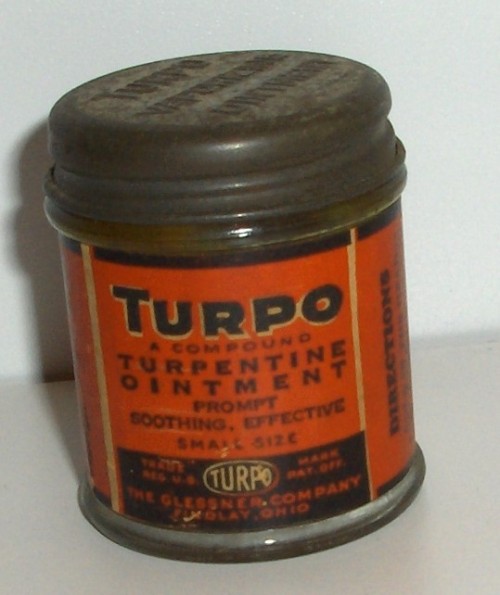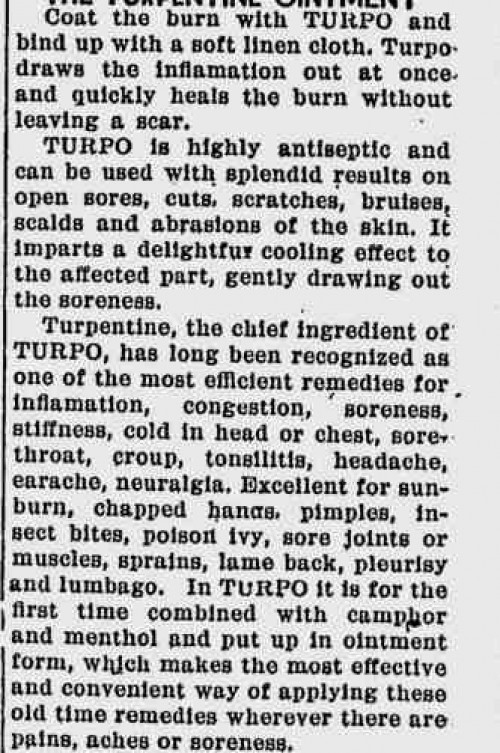Medicine
Orwell’s Cough
I just read an advance copy of Shakespeare's Tremor and Orwell's CoughFor instance, Jonathan Swift suffered from bouts of dizziness and deafness. Here's Ross on how 18th Century medicine treated him:

Posted By: Alex - Thu Jul 19, 2012 -
Comments (4)
Category: Medicine, Books
Good For What Ails You


Original ad here.
Posted By: Paul - Thu Jul 12, 2012 -
Comments (8)
Category: Medicine, Self-help Schemes, Advertising, 1920s, Alcohol
How to anesthetize a hippo
Science Daily reports that progress has been made on the problem of how to anesthetize a hippopotamus:The solution involves "a new anesthetic protocol based on the use of two non-opiate drugs." This protocol was experimentally tested on 10 hippos, all of which "recovered rapidly and completely from the procedure and showed no lasting after-effects."
The interesting detail left out of the Science Daily article, but which can be found in the original article in the Journal of the American Veterinary Medical Association, is that all 10 hippos were castrated while asleep. If they had woken up while that was happening, I'm sure they really would have been angry!

Posted By: Alex - Mon Jul 09, 2012 -
Comments (4)
Category: Animals, Medicine, Surgery
Duffy’s Pure Malt Whiskey
Back in the day, the only medicine a real man needed was pure malt whiskey running through his veins. From the Chicago Tribune, Jan 18, 1908.
Posted By: Alex - Sun Jun 24, 2012 -
Comments (3)
Category: Inebriation and Intoxicants, Medicine
Turpo

A salve made from turpentine? The same stuff you clean your paint brushes with? A wonder drug! And apparently, it cured colds, burns, and so much more!






You say you wish you could get your hands on some of this miraculous stuff? The Russians still make it! Follow the Amazon links below.
Posted By: Paul - Fri Apr 20, 2012 -
Comments (15)
Category: Health, Hygiene, Medicine, Cures for the common cold, 1920s, Russia, Diseases
The Worms Go In, the Worms Go Out
Punga - Red Cross Mexico - Donate from Not To Scale on Vimeo.
Posted By: Paul - Sat Apr 14, 2012 -
Comments (1)
Category: Death, Medicine, PSA’s, Nausea, Revulsion and Disgust
Fingernail Surgery To Remove Seborrheic Keratoses
The medical rule I've heard is that you're not supposed to pick at zits or skin growths, because you'll only make them worse — or cause an infection. But apparently this rule doesn't apply to seborrheic keratoses. According to Dr. George Lundberg, Editor in Chief of MedGenMed, go ahead and pick 'em. Or rather, use "fingernail surgery" to remove 'em. That's what he does!However, Lundberg's advice hasn't met with universal approval from the medical community. Among the resonses to his editorial on MedGenMed is this one:
I find your piece embarrassing and unworthy of your Internet service.
If you had bothered to do some research, even just reading eMedicine, you would find that curettage, not excision, is the recommended treatment -- a far more sterile version of a fingernail surgery. The curettage procedure is usually nonscarring though rarely some mild hypopigmentation may result.
The use of fingernail surgery is to be condemned as it is a bacterially contaminated area.
Picking at one's own skin with the fingernails is a bad habit and in its extreme form can become obsessive and result in scarring -- a disorder known as neurotic excoriation.
Many elderly gentlemen will pick at solar keratoses on their scalp, leaving it in a persistent state of bleeding and infection; I sincerely hope that you are not headed in this direction.
If your medical colleagues excise your seb warts or cause significant scars, or if you suspect that they choose their therapies on the basis of cost benefit to themselves, I suggest you take the matter up with your State Medical Board rather than indulging in self-injury.
If there is any doubt about the diagnosis, the curetted specimen can be sent for pathology.
Cheers,
Philip Bekhor
Melbourne, Victoria, Australia
Posted By: Alex - Wed Mar 28, 2012 -
Comments (9)
Category: Health, Medicine, Surgery, Skin and Skin Conditions
Pneumatic Quantitative Kink Enema Machine
This may be a piece of standard medical equipment, but it struck me as a bit odd. Perhaps it's just the chinglish description. From zcruiheng.cn:
Posted By: Alex - Fri Feb 17, 2012 -
Comments (13)
Category: Hygiene, Inventions, Medicine
Woman coughs out lung
A case report in the New England Journal of Medicine describes a woman who coughed so hard that she pushed her lung out through her ribs. That's got to be painful.
According to msnbc.com, violent coughing can also result in collapsed lungs, ruptured spleens, and eyeballs coming out of their sockets. Lovely!
This hits close to home for me because my wife occasionally suffers from an intense cough. She may go for several years without any problems, but when "The Cough" (as we call it) returns, it's always pretty bad. And it usually takes several months for it to go away. Thankfully it's been a while since she last had The Cough. (knock on wood).
Posted By: Alex - Fri Jan 06, 2012 -
Comments (5)
Category: Body, Diseases, Medicine
Ulcer at Work
The angst, treachery, ennui, hatred, jealousy, disdain, remorse-- It's as if Alfred Hitchcock had directed a PSA.....
And to think that we now know the condition is caused by a bacterium.
Posted By: Paul - Sun Dec 18, 2011 -
Comments (5)
Category: Medicine, PSA’s, Psychology, Stomach

| Who We Are |
|---|
| Alex Boese Alex is the creator and curator of the Museum of Hoaxes. He's also the author of various weird, non-fiction, science-themed books such as Elephants on Acid and Psychedelic Apes. Paul Di Filippo Paul has been paid to put weird ideas into fictional form for over thirty years, in his career as a noted science fiction writer. He has recently begun blogging on many curious topics with three fellow writers at The Inferior 4+1. Contact Us |




